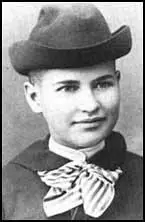Willa Cather

Willa Cather was born in Winchester, Virginia, in 1873. Brought up on a farm in Nebraska, she was educated by her mother before attending the University of Nebraska. She later moved to Pittsburgh where she found employment as a high school teacher.
In 1898 she became a journalist and began working for the Pittsburgh Daily Leader (1898-1901). This was followed by employment as associate editor of McClure's Magazine (1906-1912).
Cather published a book of poems, April Twilights in 1903. This was followed by a collection of short-stories, The Troll Garden (1908). Her first novel, Alexander's Bridge appeared in 1912. This was followed by My Antonia (1918). One of Ours (1922) a novel on the First World War won the Pulitzer Prize. Other novels by Cather included A Lost Lady (1923), The Professor's House (1925), Death Comes for the Archbishop (1927), Shadows on the Rock (1931) and Lucy Grayheart (1935).
In her later years Cather devoted herself to literary criticism, including the important, Not Under Forty (1936).
Willa Cather died in 1947.
Primary Sources
(1) Willa Cather, speech at Red Cloud High School (June 1890)
All human history is a record of an emigration, an exodus from barbarism to civilization; from the very outset of this pilgrimage of humanity, superstition and investigation have been contending for mastery. Since investigation first led man forth on that great search for truth which has prompted all his progress, superstition, the stem Pharoah of his former bondage, has followed him, retarding every step of advancement.
Then began a conquest which will end only with time, for it is only the warfare between radicalism and conservatism, truth and error, which underlies every man's life and happiness. The Ancient Orientals were highly civilized people but were dreamers and theorists who delved into the mystical and metaphysical, leaving the more practical questions remain unanswered, and were subjected to the evils of tyranny and priestcraft. Those sacred books of the east we today regard as half divine. We are not apt to think as we read those magnificent flights of metaphor that the masses of people who read and believed them knew nothing of figures. It is the confounding of the literal and the figurative that has made atheists and fanatics throughout the ages.
(2) Boston Evening Globe (14th May 1925)
The modern novel, the motion picture, and the radio are a menace to human culture, declared Willa Cather, the author, in a lecture last evening on "The Talk About Technique'' at the Bowdoin College Institute of Modem Literature.
Regarding the novel in general, Miss Gather said that she had rather pessimistic feelings. The present-day novel was largely used as an aid to travelers, she said, to assist them in passing the time while riding from place to place.
"The novel, as we know it today, is the child of democracy, and is not a high form of art. A novel today partakes of all of our infirmities. The novel is too easy to write and too easy to read. You join a group of a dozen friends and you will find some one who cannot pass on music or a painting, but who does not hesitate to criticize a novel, and most of the group feel that they could write one.
"In critical magazines, at dinners, and at women's colleges one hears much talk about technique, but you never hear it mentioned or talked of by writers. Young critics and young professors usually have much to say about it to their classes.
"Atmosphere was just as effective before it had a name. It is only the writer's personal relation with the locality. It should be felt and not heard. The writer's relationship to his material is not only his emotional and moral relationship, but also his spiritual. Every thoughtful writer has to decide on his relationship as necessarily as the architect has to figure the strain on a bridge. It is really a technical matter in which the fine artist excels and the clumsy one remains clumsy.
"Technique, as it applies to a novel, is full of faults, as nearly all great novels have great blemishes from the standpoint of technique. Novels live by their plusses, not by their minuses. They live because of what they have, not because of what they lack. You cannot improve on the technique of a great writer, because his faults are necessary. Laboratory methods are best in science, but have not place in art."
